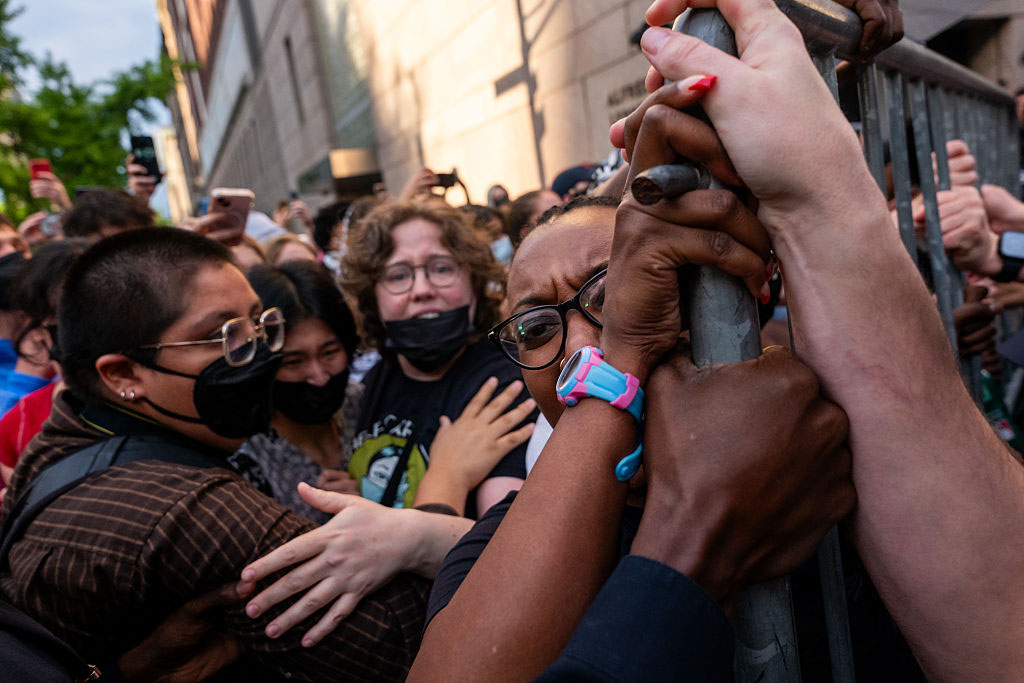Columbia University Jewish student Eden Yadegar told The Journal about her experience inside the main university library on May 7 when anti-Israel protesters occupied the building, saying that she was “stunned” and that “my mind went to Jan. 6”
According to The Washington Free Beacon, 81 people arrested over the events of that day, 44 of whom are Columbia students; additionally, at least 13 of them are students at Barnard College (Columbia’s sister school), two are students at Columbia affiliate Union Theological Seminary and another is a faculty member at Columbia. At least six of the individuals are repeat offenders. According to Reuters, the university suspended more than 65 students and banned 33 other individuals from campus.
Yadegar, a Los Angeles native and senior who will be graduating this spring, said that “several dozen masked protesters stormed” the library at around 3:15 pm EST and “violently occupied the main reading room on campus where students were studying for finals, completing coursework, etc.” She described the protesters as “shoving public safety officers and essentially stampeded through the library and into this room, chanting things like ‘there’s only one solution, intifada revolution’ and in Arabic ‘from the water to the water, Palestine is Arab.’” According to the Free Beacon, the protesters “passed out pamphlets endorsing Hamas’s violence, vandalized and damaged the library, and renamed it after Bassel al-Araj, a Palestinian terrorist killed in a 2017 shootout with the Israel Defense Forces.”
“If this sort of violent stampede of a building were driven by any other ideology or motive, it would have been swiftly condemned and decried by the very faculty members that were engaging in it and promoting it,” – Eden Yadegar
Eventually, public safety officers closed off the room so other protesters couldn’t join.
“I was inside that room in the library and I was recording,” Yadegar said. “I was stunned.” She posted videos of the disruption to social media.
RIGHT NOW AT COLUMBIA: Masked anti-Israel students just broke into the library during finals week.
Columbia Public Safety unsuccessfully attempted to stop them. pic.twitter.com/vBfkQFlwUW
— Eden Yadegar (@edenyadegar) May 7, 2025
Welcome to finals week at Columbia University. pic.twitter.com/rY6j9NWoRi
— Eden Yadegar (@edenyadegar) May 7, 2025
The officers encouraged people to leave, but those that wanted to leave had to identify themselves; the protesters refused to identify themselves, according to Yadegar, and “they would tryto stampede basically and shove public safety officers to get out and go march from the library.” She believes that at least two public safety officers were injured by the protesters.
Columbia University right now:
Public Safety is currently clearing out all other rooms on the lower floors of Butler Library. Why are the protestors able to continue disrupting the basic function of our university while all other students have to pay the consequences? pic.twitter.com/e1q35pzJNf
— Eden Yadegar (@edenyadegar) May 7, 2025
The masked @ColumbiaBDS protestors are now trying to leave the room they are in to march throughout the library, but Public Safety is not letting them exit without providing identification.
Accountability matters! pic.twitter.com/bhQ90tXU3F
— Eden Yadegar (@edenyadegar) May 7, 2025
🚨Columbia Public Safety is now issuing the first and only warning that all protestors will be subject to arrest if they don’t provide identification and exit the library.
An important step from Columbia – now let’s see if they follow through. pic.twitter.com/4YZVdTIiOJ
— Eden Yadegar (@edenyadegar) May 7, 2025
A few hours later, another group of anti-Israel protesters were outside the library “trying to stampede their way in, again shoving and harassing and hitting public safety, calling them slurs, making fun of them, it was really, really terrible,” added Yadegar, “and obviously the animus behind this is deeply anti-Jewish, anti-Israeli and anti-Western, deeply illiberal and also inherently opposed to the most basic function of the university which is teaching, learning and researching, learning from one another. These protesters are not interested in doing that and are rather interested in wreaking havoc, harassing Jewish and Israeli students, harassing members of Columbia’s public safety team.”
🚨Additional protestors from outside the library are currently shoving Columbia Public Safety trying to rush into the library. Public Safety is trying to shut and lock the door.
Protestors are also still occupying the main reading room upstairs…. Madness. pic.twitter.com/5IH0uTIR5O
— Eden Yadegar (@edenyadegar) May 7, 2025
She noted the irony of “scores of privileged Ivy League students calling Columbia public safety officers, the majority of whom are people of color” as being “agents of oppression” and “pigs.” “Their hypocrisy is so deeply blinding,” Yadegar said.
Yadegar called it absurd that the protesters are claiming to be victims who were held hostage, which Yadegar viewed as being “out of touch with reality and so deeply offensive” given that there are 59 Israelis and Americans being held hostage “by the very terrorists that this group of protesters has been praising and idolizing” and all the protesters had to do was simply show their ID.
She pointed out that “several faculty members, primarily humanities faculty members” joined in with the protesters. “If this sort of violent stampede of a building were driven by any other ideology or motive, it would have been swiftly condemned and decried by the very faculty members that were engaging in it and promoting it,” Yadegar contended. “My mind went to Jan. 6: if this group of rioting students — and accompanied later on by faculty — if they were on a different side of the political spectrum, I think we would be having a very different conversation.”
Yadegar believes that “patience is wearing thin” among students over these protests, including students who are not Jewish or Israeli and do not have any sort of connection to the conflict, because their finals week was disrupted “by this group of entitled, bigoted disruptors. I think people were incredibly frustrated … people are just trying to study and learn and this fringe group is trying to disrupt that for everyone.”
Claire Shipman, the acting president of the university, said in a May 7 statement that the reading room was “defaced and damaged in disturbing ways and with disturbing slogans. Violence and vandalism, hijacking a library — none of that has any place on our campus. These aren’t Columbia’s values.
“Let me be clear: Columbia unequivocally rejects antisemitism and all other forms of harassment and discrimination,” she continued. “And we certainly reject a group of students — and we don’t yet know whether there were outsiders involved— closing down a library in the middle of the week before finals and forcing 900 students out of their study spaces, many leaving belongings behind. Our commitment to a safe, inclusive, and respectful campus community is unshakeable, and we will continue to act decisively to uphold these values.”
Shipman added that she is “particularly heartbroken, and incensed, that this disruption occurred when our students are intensely focused on critical academic work. At a moment when our community deserves calm and the opportunity to study, reflect, and complete the academic year successfully, these actions created unnecessary stress and danger. I have seen how much our community wants to take back our narrative, to do what they came to Columbia to do — learn, thrive, and grow — not take over a library. Moreover, I am deeply disturbed at the idea that, at a moment when our international community feels particularly vulnerable, a small group of students would choose to make our institution a target.” She proceeded to state that “we need to recognize that when rules are violated, when a community is disrupted for the sake of a few, that is a considered choice — one with real consequences. There is a clear line between legitimate protest and actions that endanger others and disrupt the fundamental work of the University. Today that line was crossed, and I have confidence the disciplinary proceedings will reflect the severity of the actions.”
Columbia Professor Shai Davidai posted on X that Shipman’s statement was “very good” but fell short of an “A+.” “1. Very abstract, making no actual commitments of expulsion for what it clearly a blatant breach of the rules,” he wrote. “2. Does not discuss the history of how this has been going on for 18 months, and how this is the result of empty statements and videos like this one 3. Does not discuss some professors POSITIVE reaction to the protests 4. Does not discuss the two main issues: the university’s admission process and its indoctrination professors.
“I give it an A-, but with much room for improvement.”
It’s a very good response but not an A+.
Here’s why:
1. Very abstract, making no actual commitments of expulsion for what it clearly a blatant breach of the rules
2. Does not discuss the history of how this has been going on for 18 months, and how this is the result of empty… https://t.co/KUumLskzUm— Shai Davidai (@ShaiDavidai) May 8, 2025
Yadegar told The Journal that the university’s response as “a step in the right direction” and that public safety handled it “as well as they could have. … I’m very grateful to Columbia leadership for stepping up and calling in the NYPD within four hours, which is record speed for Columbia,” she said. “Last year it took days and weeks at certain points. It’s ridiculous that we’ve gotten to this point, but we’ve learned that when there is no accountability, students feel empowered to continue disrupting.”
The soon-to-be graduate believes that this academic year has “felt at times quieter on campus than last year did, but that doesn’t necessarily mean that it felt better to be a Jewish or Israeli student here because the level of vitriol and animosity toward the state of Israel has far from subsided, it’s been normalized and it’s become mainstream … the hate doesn’t go away because some of the voices are quieter.”




